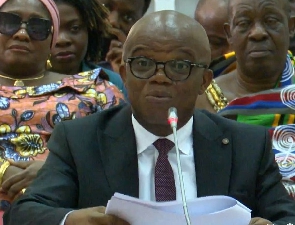The Deputy Minister of Trade and Industry, Dr Stephen Amoah, has stressed the need for the dominant political parties to come to consensus on a common development agenda for the country.
He said the unnecessary partisanship in government policies had thwarted the development of the country.
Dr Amoah who stated this at an economic seminar in Accra on Wednesday, said the various political actors and stakeholders must be united on a common development agenda for the country.
The programme dubbed Financial Economics Seminar – Ghana, 2023 was on the theme “Impact of socio-economic policies on trade and industries in developing economies,” was organised by the Financial Economics Institute Africa, a financial and economic think tank.
The programme brought experts from government and private sector to discuss challenges facing the country’s economic development and proffer solutions to them and also policies to promote trade in the country.
Dr. Amoah said the country could have developed more than it is today if all the stakeholders agree on a common development path, devoid of partisanship.
According to him, if a government initiated a policy, the party which was not in government, would not support the policy even if it would benefit the country.
Dr Amoah called for the effective usage of the taxes raised in the country to motivate the citizens to honour their tax obligations.
Dr Amoah also stressed the need for all the stakeholders in the country to work together to help reduce the country’s reliance on loans to finance development projects in the country.
The President of the Ghana Union Traders Association (GUTA), Dr. Joseph Obeng, said the country’s Industrialisation agenda could be achieved if a conducive environment is not created for the businesses of traders to thrive.
He said a vibrant trading sector would be needed to offtake and sell the products which would be produced by the industries being established in the country.
Mr Obeng, therefore, entreated the government to remove some taxes it had introduced on the trading community to give them financial respite and help traders to raise low-interest credit to finance their business operations.
He mentioned some of the taxes he described as obnoxious as the COVID-19 Levy, Special Levy on Import and the VAT Flat Rate.
“These taxes are counterproductive and does promote tax compliance. It will not help in the government’s quest to industrialise the country,” Dr Obeng stated.
Dr Obeng said industrialisation thrives on a vibrant trading sector because trade was the distributive leg of industrialisation.
According to him, credit in Ghana was overpriced and taxes in the country were too high and thus made the cost of doing businesses too high.
The President of the Ghana Chamber of Commerce and Industry, Mr Clement Osei-Amoako, said the government should support the private sector to create business giants to take commanding heights of the economy.
He said the country needed business giants with strong financial capacity to invest in the various sectors of the economy.
Mr Osei-Amoako said government should come out with policies that would help to address, credit, investment and labour challenges facing the country to spurt the private sector and promote growth of the economy.
Politics of Saturday, 1 July 2023
Source: ghanaiantimes.com.gh

















